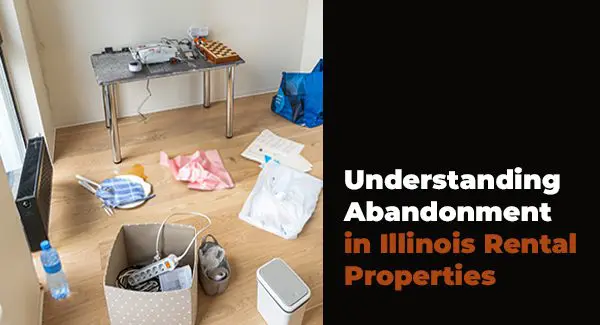- Landlord & Tenant Law
- Illinois
Abandonment in rental properties can be deceptively complex. While it may seem clear-cut when a tenant “skips out,” Illinois law and local ordinances in places like Chicago, Cook County suburbs, and collar counties introduce many nuances that landlords must carefully navigate.
This article will review how abandonment is defined, how it varies by jurisdiction, and what steps landlords should follow to confirm a unit has been abandoned legally and safely.
What Is Abandonment?
Abandonment generally occurs when a tenant leaves a rental unit without formal termination of the lease and fails to pay rent. But how it is defined and what constitutes abandonment varies depending on your location and specific facts, including:
- Whether the tenant gave written notice
- Whether keys were returned or left behind
- Whether rent was paid
- Whether personal belongings remain in the unit
- How long the tenant has been absent
Jurisdiction Matters: Key Differences in Cook County
Abandonment is treated differently in various Illinois locations including Chicago, Cook County suburbs, and specific Chicagoland suburbs such as Evanston and Mount Prospect.
Chicago – Under the Chicago Residential Landlord and Tenant Ordinance (RLTO) abandonment of a rental unit may occur in the following situations:
- Scenario 1: Written notice from the tenant that they are not returning
- Scenario 2: 21 days of absence, no rent, and no personal belongings
- Scenario 3: 32 days of absence, no rent, with personal belongings remaining
To avoid a wrongful eviction lawsuit, there are various best practices to implement that include providing proper notice, inspecting signs of occupancy, storing remaining personal property, changing locks, and retaking possession of the unit.
Cook County Suburbs – Cook County’s RTLO applies similar principles but defines abandonment more narrowly:
- Scenario 1: Written notice from the tenant
- Scenario 2: 32 days of absence, unpaid rent, and all personal property removed
Best practices include proper notice, inspection, and photo documentation.
Evanston, Oak Park, and Mount Prospect – These Cook County suburbs have specific notice requirements for unpaid rent, unexplained absence, or written intent to vacate. These suburbs also uniquely address how a landlord may dispose of personal property and retrieval notices.
Abandonment in Collar Counties (Lake, DuPage, Will, McHenry, Kane)
Unlike Chicago and Cook County, the collar counties do not have a local ordinance that defines abandonment. In these areas, landlords must rely on the lease agreement, strictly following any defined abandonment terms such as days of absence plus unpaid rent.
If the lease lacks specifics, landlords should default to a cautious, standardized process. To protect against wrongful eviction claims, best practices include providing proper notice, inspecting the unit, taking photos, and documenting absence or lack of occupancy, changing locks, and retaking possession of the unit. Landlords should avoid acting too quickly. For example, a tenant’s two-week absence may still fall within the bounds of a vacation or family emergency.
The Legal Duty to Mitigate Damages
Landlords in Illinois must mitigate a tenant’s financial damages after abandonment. This means:
- Marketing the unit as soon as possible after retaking possession
- Re-renting the unit at fair market value
- Documenting efforts to show you fulfilled your duty as a landlord
Once re-rented, the tenant who abandoned the unit is liable for rent until either the lease end date or the date of re-rental, whichever comes first. Reasonable re-leasing costs (ex. brokerage fees) can be included in the amount owed.
Abandonment and Early Termination (Buy-Out)
One common mistake is applying a lease’s buy-out fee to an abandonment situation. Abandonment occurs when a tenant vacates the unit without notice or agreement and does not follow any buy-out terms. In this case, the landlord should not charge a buy-out fee and the tenant remains liable for rent through the lease end date or the date the unit is re-rented, whichever comes first.
A buy-out, or early termination, is governed by the lease contract and typically requires actions like providing proper notice and paying a fee (ex. two months’ rent). If the tenant fulfills all buy-out terms, they can be released from the remainder of the lease and the landlord may charge the agreed-upon buy-out fee. For added protection, it’s a best practice to execute a written early termination agreement that includes a release of claims and a confidentiality clause.
Legal Resource
Understanding and handling tenant abandonment requires careful attention to jurisdiction-specific rules and lease terms. Illinois landlords and rental property managers should always follow proper procedures (ex. giving proper notice, documenting inspections, observing required waiting periods) to avoid legal pitfalls.
To ensure legal compliance and reduce liability, landlords should regularly review their lease language and procedures with an experienced landlord/tenant attorney. Staying proactive and informed can help protect your property and your rights.
Questions about abandonment, buy-outs, customizing your lease terms or other landlord legal issues? Our experienced landlord/tenant attorneys are here to help.
Call KSN toll-free at 855-537-0500 or visit www.ksnlaw.com.
Since 1983, KSN has been a legal resource for condominium, homeowner, and townhome associations. Additionally, we represent clients in real estate transactions, collections, landlord/tenant issues, and property tax appeals. We represent thousands of clients and community associations throughout the US with offices in several states including Florida, Illinois, Indiana, and Wisconsin.
Please note the material contained in this article is for educational and informational purposes only and does not constitute legal advice. No attorney-client relationship is established by your review or receipt of the information contained in this article. You should not act on the information discussed in this article without first obtaining legal advice from an attorney duly licensed to practice law in your State. While KSN has made every effort to include up-to-date information in this article, the law can change quickly. Accordingly, please understand that the information discussed in this article may not yet reflect the most recent legal developments. Material is not guaranteed to be correct, complete, or up to date. KSN reserves the right to revise or update the information and statements of law discussed in the article at any time, without notice, and disclaims any liability for your use of information or statements of law discussed on the article, or the accessibility of the article generally. This article may be considered advertising in some jurisdictions under applicable law/s and/or ethical rules/regulations. © 2025 Kovitz Shifrin Nesbit, A Professional Corporation.



